
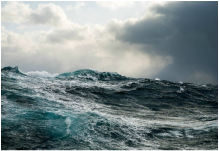
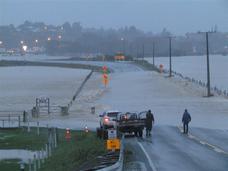
A series of opinion pieces on, mostly climate change and related subjects to do with New Zealand.
 A recent paper by James Hansen and 18 other scientists showed that there was a strong possibility of major storms in the Atlantic that were likely to be way outside the experience of modern history. The extra power of these storms was caused by the rise in temperature of the world and the changing differential between the poles and the equator would give them extra strength.  The situation in the Southern hemisphere is likely to be more extreme than the Atlantic, where the research evidence was found. The Antarctic continent is very high and continues to be very cold while the Equator continues to warm which increases the temperature differential between the two regions. We are already seeing signs of this with the 20% increase in the proportion of Westerly winds in New Zealand and the increase in winter sea ice surrounding the Antarctic, which is caused by stronger winds blowing the ice away from the continent.  The problem for New Zealand is that the South Island lies in the path of the roaring forties and is in the direct path of the route these powerful storms would travel. While the mountains on the West coast mostly protect the more heavily populated Eastern areas, there are still a lot of people and infrastructure that would be exposed to risk. Towns like Invercargill, Bluff and Dunedin and even Wellington, might have to re-evaluate their climate change strategy to accommodate the damage that a hurricane sized storm can do.
7 Comments
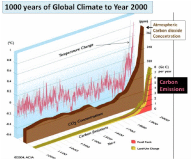 If we started including the social and environmental damage that fossil fuels do into the selling price of oil and coal, what would be a fair price? The scale of the implication makes it very difficult to imagine how this can work or even comprehend the concept. We understand that the burning fossil fuels is putting more CO2 into the atmosphere and that it is changing the climate and threatening our way of life. The main threats are rising temperatures, changing weather patterns, increased ocean acidity and rising sea levels and it includes the whole world, so should we put the cost onto the price of a litre of petrol and would anyone understand? 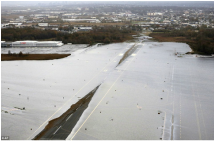 If we scale the problem down so that we take the City of Auckland as a closed system and said that the use of oil for transport will cause sea levels will rise by one metre by 2050 to 2070 and at that point Auckland airport will be flooded (which it will) and we will have to build a new one in another place. How much social cost should we add to the price of a litre of petrol or diesel? That is the problem but on a much bigger scale. At the moment there are no social or environmental costs included in fossil fuels but if there were, we would be a lot more responsible and aware of what we are doing. 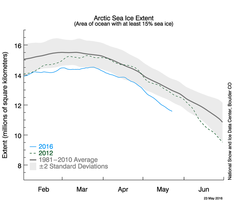 A lot of scientists are getting very worried about this years melting of the Arctic sea ice as it is way below normal. The very warm winter reduced the new ice cover and storms have broken up regions of ice making a bad start to the summer melt. There is some way to go yet but as the NASA satellite chart shows the season has made a disastrous start.  A few things have happened recently, both good and bad, that makes me wonder if we are doing our share to avert an impending climate disaster. On the good side we have signed and ratified the COP21 climate agreement and just announced a positive policy to introduce some electric transport. On the negative side we have delayed the closure of the Huntley power station coal fired boilers and Fonterra are opening two new dairy processing plants which will use coal to dry the milk into powder. 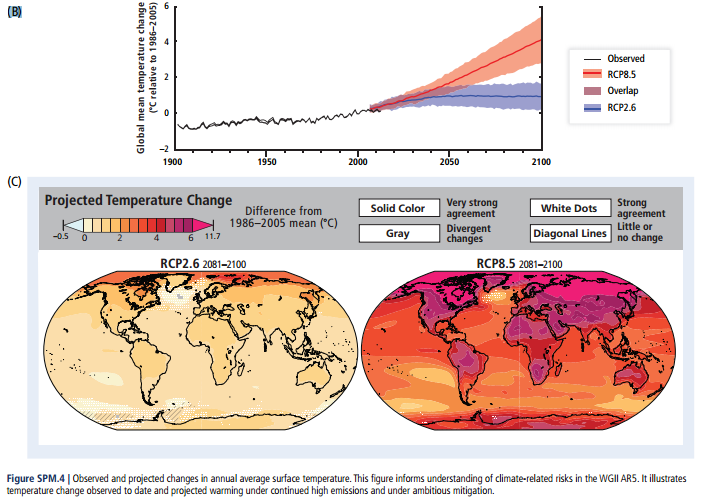 The UN have commissioned a huge amount of scientific research both in the IPCC reports and the COP21 agreement that set out what we need to do to avert disaster and how much we do, or don’t do will result in certain outcomes. The best outcome that we can hope to achieve is a 1.5 C increase in temperature above 1880 (about where we are now) and it requires that we stop burning fossil fuels immediately, change our farming systems and then start removing CO2 from the atmosphere. We are clearly not going to do that but it does highlight the situation that, as we get further into the century and the climate disasters start to get much worse we will have to act rapidly to stop using oil and coal and start to remove CO2 from the atmosphere. 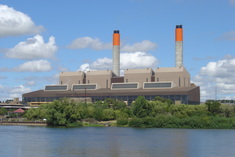 To highlight the scale of the problem by looking at our two negative decisions with burning coal, we will eventually have to remove the CO2 we are adding to the atmosphere. If the single Huntly coal fired boiler is running at near capacity, it will be burning around 1000 tons of coal a day or 365,000 tons a year. To sequester the CO2 from this burning we will have to plant 40 trees per ton and this will amount to 14,600,000 trees for every year of operation. The Fonterra boiler may burn 100 tons of coal a day for each operation and just one will burn 36,500 tons of coal a year and they will need to plant 1,460,000 trees a year to soak up the CO2 they are putting into the atmosphere. The scale of the problem is huge but avoiding it today only piles up problems for the future and we have already wasted thirty years when the problems have been apparent but the people and the politicians political will have not been there and prepared to face the facts and take action. It is much cheaper to face the problems now and reduce the disaster that is imminent.
|
Bob BinghamOccasional blog posts on topical news items concerning the climate. Please click the RSS feed to receive updates. Categories
All
|
